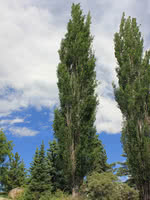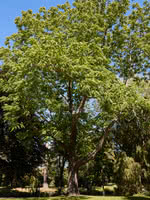Mon-Fri 9am - 5pm Mountain time
Swedish Aspen vs Black Walnut
Populus tremula Erecta
Juglans nigra
NOT AVAILABLE THIS SEASON - MIGHT RETURN
Swedish Aspen is an extremely fast growing columnar aspen tree. It's ideally suited for urban settings where space is limited such as privacy screens or along the edges of driveways. Swedish aspen produces no fluff and is less prone to suckering than tower poplar. Swedish aspen thrives in a variety of growing conditions with little maintenance or pruning.
We grow this species over a two year production method from root cuttings via the Smoky Lake Styro-Stack method (SSS method) first pioneered at Smoky Lake Forest Nursery in 2002. This method has quickly become the gold standard in the reforestation nursery industry for growing clonal aspen.
We are well known for pioneering its use worldwide and currently produce some of the highest volumes of Swedish Aspen in Canada.
The Black Walnut is a slow growing, large, straight-stemmed tree with an open crown. It produces dense, very hard, edible nuts.
Black Walnut has a deeply-furrowed, black bark. Its leaves are about 1 foot long, composed of 15 - 23 slightly stalked leaflets on a moderately stout stock which provide good dappled shade.
Despite being highly valued for its edible nuts and its shade tree aesthetics, it is rare to see this tree on the prairies.
Note: Black Walnut's roots produce a substance named juglone that is toxic to some other plants. Consider this when choosing where you plant a black walnut, as you will not be able to grow tomato, potato, cabbage, eggplant, blueberry, azalea, rhododendron, lilac, red pine and apple in the surrounding area.
Note: Plant this tree once. It will not respond well to transplanting.
Note: Although self-pollinating, planting two trees significantly improves nut production.
A top CO2 absorbing species. Experts think this tree may help climate change more than others.

